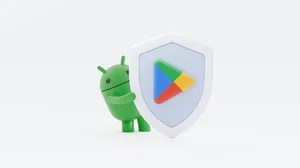The latest AI news we announced in October
For more than 20 years, we’ve invested in machine learning and AI research, tools and infrastructure to build products that make everyday life better for more people. Teams across Google are working on ways to unlock AI’s benefits in fields as wide-ranging as healthcare, crisis response and education. To keep you posted on our progress, we're doing a regular roundup of Google's most recent AI news.
Here’s a look back at some of our AI announcements from October.

This October, we accelerated our work to bring major AI breakthroughs and research into tools that can improve the reality of people's everyday lives. That included using AI to make technology easier and more natural by rolling out Gemini for Home and a vibe coding experience in AI Studio, making it simpler to build AI apps. We also launched new anti-scam and AI security features for Cybersecurity Awareness Month to protect people from digital threats. And we continue to apply advanced AI to tackle huge global challenges, using it to discover a new pathway for cancer therapy and speed up the development of clean fusion energy. Ultimately, it's all about putting AI to work to make life better, safer and more productive for everyone.

We announced the first-ever algorithm to achieve verifiable quantum advantage on hardware. In a historic first, our Quantum AI team successfully ran a verifiable algorithm on quantum hardware that surpassed even the fastest classical supercomputers (13,000x faster). The algorithm, which we call “Quantum Echoes,” computed the structure of a molecule and paved a path towards real-world applications, like quantum computers that can drive discoveries in areas like medicine and materials science.
We showcased our latest research breakthroughs at Research@. At the event we shared our approach to the “magic cycle” of innovation, the Quantum AI team’s hardware that is accelerating the field of quantum computing, new updates to Google Earth AI, and how our open-source AI model DeepSomatic is speeding up genetic analysis for cancer research.
We launched an AI model that helped discover a new potential cancer therapy pathway. Google DeepMind and Google Research teamed up with Yale to create Cell2Sentence-Scale, an AI model based on our Gemma family of open models that could help make tumors easier for your body's immune system to spot and fight, offering a new cancer therapy approach. Researchers can now access the model to build on this work.
We’re using AI to accelerate the next generation of fusion energy. Google DeepMind’s collaboration with Commonwealth Fusion Systems (CFS) focuses on applying advanced AI to bring clean, safe, limitless fusion energy closer to reality.

We released the new Gemini 2.5 Computer Use model for developers. This specialized model is available via the Gemini API and lets AI agents interact directly with user interfaces. Built on Gemini 2.5 Pro, it handles complex tasks like navigating websites and filling out forms, offering faster performance and outperforming alternatives on benchmarks.
We rolled out significant updates to our AI filmmaking tool Flow. The newest features give people greater creative control and enhanced storytelling capabilities. Now with Veo 3.1 creators can refine their videos with more precision, including using multiple images to control characters and style, bridging two distinct frames into a seamless video, and generating rich, integrated audio across all features.
We introduced new vibe coding features in Google AI Studio. Our new vibe coding experience lowers the barrier to building AI-powered applications. You can now simply describe your multimodal app idea, and Gemini automatically handles the complex process of wiring up the necessary models and APIs. We also shared a primer on vibe coding to help people get started.
We launched Gemini Enterprise, the new front door for Google AI in the workplace. CEO Sundar Pichai introduced Gemini Enterprise, designed to be the "front door" for Google AI in the workplace. Moving beyond simple chatbots, Gemini Enterprise helps companies move forward by using the most advanced Gemini models and grounding them in a company's data. This secure platform helps employees build, deploy and centrally govern AI agents, with early adopters like HCA Healthcare and Best Buy already reporting positive results.

We rolled out new security features to shield you from scams and threats. For Cybersecurity Awareness Month, we announced new protections in Google Messages, new account recovery methods and even a new AI agent for code security. We also shared a look at our strategy for tackling emerging AI threats, including an expanded AI Vulnerability Reward Program and a new Secure AI Framework 2.0 for guidance on agent security risks.

We welcomed the next era of Google Home. The new era includes a completely redesigned Google Home app for unified management, and new Nest and Google Home devices engineered specifically for Gemini's enhanced AI capabilities. Our new Gemini for Home got an AI upgrade that changes how you can interact with your smart home devices. It replaces the Google Assistant on speakers and displays with a more conversational, context-aware AI.
We launched the first headset powered by Android XR. The new Samsung Galaxy XR headset uses integrated Gemini AI to create an immersive experience that blends the digital and physical worlds. The AI is designed to understand your context, enabling real-time help and actions — like instantly providing player stats during a basketball game, answering questions about landmarks in Maps, or letting you use your voice to effortlessly organize your virtual workspace.

We launched Google Skills, a new learning platform for everyone. Google Skills includes nearly 3,000 courses and labs to help you build expertise in AI and other technical areas. You can learn from Google experts, gain hands-on experience and earn credentials.







